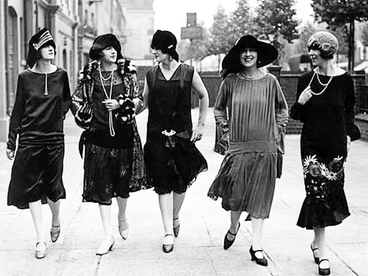|
The twenties will soon be with us again … While reading a George Orwell essay a few years ago, I was momentarily thrown by a mention of ‘the nineties’. Was he already looking beyond 1984? It soon dawned on me that he meant the 1890s – a decade that was fairly recent in his day, but now seems far behind us.
Editors and linguists often talk about how elements of the English language evolve over time as a result of social change, migration, technology and so on. Well, here’s one that sometimes has to change purely because of the passage of time. For the best part of a century, we had handy names for decades: the twenties, the fifties, the seventies – right up to the nineties. People began to associate them with trends in fashion, music and social attitudes: the Roaring Twenties, the Swinging Sixties. The first two decades of the twentieth century (as with any other) didn’t lend themselves to handy labels: ‘the 1900s’ could be taken to mean 1900 to 1999, and ‘the 1910s’ has a certain awkwardness because its pronunciation – ‘the nineteen-tens’ – bears little relation to the names of its individual years. Later, though, people got used to omitting the ‘nineteen’ part in less formal contexts: hence ‘the twenties’ and so on. This was all very neat and tidy until we hit 2000. Suddenly, we were in another era of apparently nondescript decades. Few people seem to be interested in distinguishing between the 2000s and the 2010s, or in associating these decades with trends. No doubt this is largely because they lack catchy names (‘the noughties’ and ‘the teenies’ were suggested, but, thankfully, never really caught on), but it might also be a hangover from the impact of reaching ‘The Year 2000’. After such a dramatic change in the year number, with all four digits changing at once, perhaps decades seemed less significant than before. Have we got out of the habit of affording importance to them? It won’t be long before this is put to the test. In just a few years it will be the twenties all over again; soon, to some extent or other, people will start looking ahead to that decade. For those of us who write, edit or proofread for a living, and those who manage the style guides that we follow, this will present a new challenge. How ambiguous will ‘the twenties’ be? Should we refer long-windedly to the ‘1920s’ and ‘2020s’, or even – where the style rules demand the use of words – the ‘nineteen-twenties’ and ‘twenty-twenties’, to prevent any possible confusion? Will these twenties roar or just whimper? Twenty years ago, there was no real problem with the term ‘the nineties’, as the 1890s were rarely mentioned; but the 1920s – a period of radio, films and wild dancing – still seem quite familiar today. A reference to ‘the twenties’ might conjure up that decade in the reader’s mind, unless the context makes the correct meaning instantly obvious. Meanwhile, roll on the (twenty-)twenties …
0 Comments
|
Thoughts on Words
An editorial blog. Posts by Graham Hughes. Archives
July 2024
Categories |




